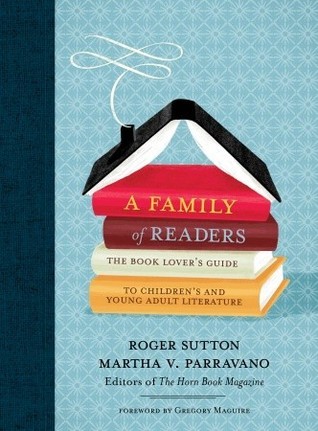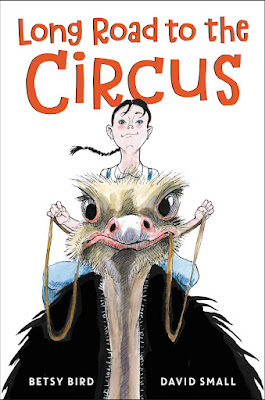It's a Book
I attended a "conversation" this evening with Horn Book editors Roger Sutton and Martha V. Parravano. They recently published a book called A Family of Readers: The book lover's guide to children's and young adult literature. These literary folk were gathered to talk about some of the articles and ideas presented in this book. I was intrigued by notions brought up by the two authors as well as the audience. Topics about the quality of literature and whether or not we should encourage kids to read anything vs. only "fine" children's literature, what makes a child an avid reader, etc. sparked my curiosity and will probably be the subject of posts to come. But there was one subject that has been on my mind, both as a future bookstore owner and a teacher.
It is this notion of the role technology will play in the world of children's literature. We have seen the rise of the Kindle and other reading devices that take the printed word and make it digitally accessible. Does this mean that the days of the tangible book are limited? Roger Sutton wrote an entry on his blog about this just a few days ago. I do believe in the romance of having a book to hold, the magic of sitting with a parent, grandparent, aunt, uncle, etc. and turning the pages to unveil a story that is being read aloud. Will that all go away? Will children gently place their finger upon a screen and swipe left to "turn" the page? And if so, is that bad?
As a teacher I can appreciate the technology because it makes reading accessible to students who face difficulties as readers. Students with vision problems can make text bigger on a screen so it is easier to read. A student who can comprehend difficult stories but may not be able to read the words can have a book read to them so that he or she can access the same information as their peers. These are just a few of the perks. Students can also click on words to learn their meanings, they can break words into parts to hear the different sounds. How can this be bad?
But what about the job of the book seller? Should we be including books online as part of our duty to the growing technology? Do we reach a wider audience by making digital books available? And if everything becomes downloadable, is there even a place for a niche such as children's bookstores? Should teachers utilize the technology and book sellers keep the magic alive? Maybe both have a role in delicate balance of books.
The debate could go on and on. I am not sure where I stand on this issue just yet. My heart wants to say, just as the message in You've Got Mail, that everyone needs a "shop around the corner." But in order for my dream to come true, do I have to make any sort of compromise? Maybe there is a sense of social justice in making reading accessible to everyone by including both print and digital media.
For those of you interested in this topic, here are two book recommendations:
1. A Family of Readers: The book lover's guide to children's and young adult fiction by Roger Sutton and Martha V. Parravano. This is a great guide written specifically with parents in mind, about books that will engage your readers.
2. It's a Book by Lane Smith. This picture book addresses the world of technology vs. books. One character explains to a tech-savvy youngster just what a book is. Be warned, there is some colorful language that will make you smile but that you might not want repeated at home. I say, read it anyway and have a great conversation about words with multiple meanings. ;-)
And, just because the technology is out there, here is a youtube video of part of Lane Smith's book. Enjoy!
It is this notion of the role technology will play in the world of children's literature. We have seen the rise of the Kindle and other reading devices that take the printed word and make it digitally accessible. Does this mean that the days of the tangible book are limited? Roger Sutton wrote an entry on his blog about this just a few days ago. I do believe in the romance of having a book to hold, the magic of sitting with a parent, grandparent, aunt, uncle, etc. and turning the pages to unveil a story that is being read aloud. Will that all go away? Will children gently place their finger upon a screen and swipe left to "turn" the page? And if so, is that bad?
As a teacher I can appreciate the technology because it makes reading accessible to students who face difficulties as readers. Students with vision problems can make text bigger on a screen so it is easier to read. A student who can comprehend difficult stories but may not be able to read the words can have a book read to them so that he or she can access the same information as their peers. These are just a few of the perks. Students can also click on words to learn their meanings, they can break words into parts to hear the different sounds. How can this be bad?
But what about the job of the book seller? Should we be including books online as part of our duty to the growing technology? Do we reach a wider audience by making digital books available? And if everything becomes downloadable, is there even a place for a niche such as children's bookstores? Should teachers utilize the technology and book sellers keep the magic alive? Maybe both have a role in delicate balance of books.
The debate could go on and on. I am not sure where I stand on this issue just yet. My heart wants to say, just as the message in You've Got Mail, that everyone needs a "shop around the corner." But in order for my dream to come true, do I have to make any sort of compromise? Maybe there is a sense of social justice in making reading accessible to everyone by including both print and digital media.
For those of you interested in this topic, here are two book recommendations:
1. A Family of Readers: The book lover's guide to children's and young adult fiction by Roger Sutton and Martha V. Parravano. This is a great guide written specifically with parents in mind, about books that will engage your readers.
2. It's a Book by Lane Smith. This picture book addresses the world of technology vs. books. One character explains to a tech-savvy youngster just what a book is. Be warned, there is some colorful language that will make you smile but that you might not want repeated at home. I say, read it anyway and have a great conversation about words with multiple meanings. ;-)
And, just because the technology is out there, here is a youtube video of part of Lane Smith's book. Enjoy!




Comments
Post a Comment